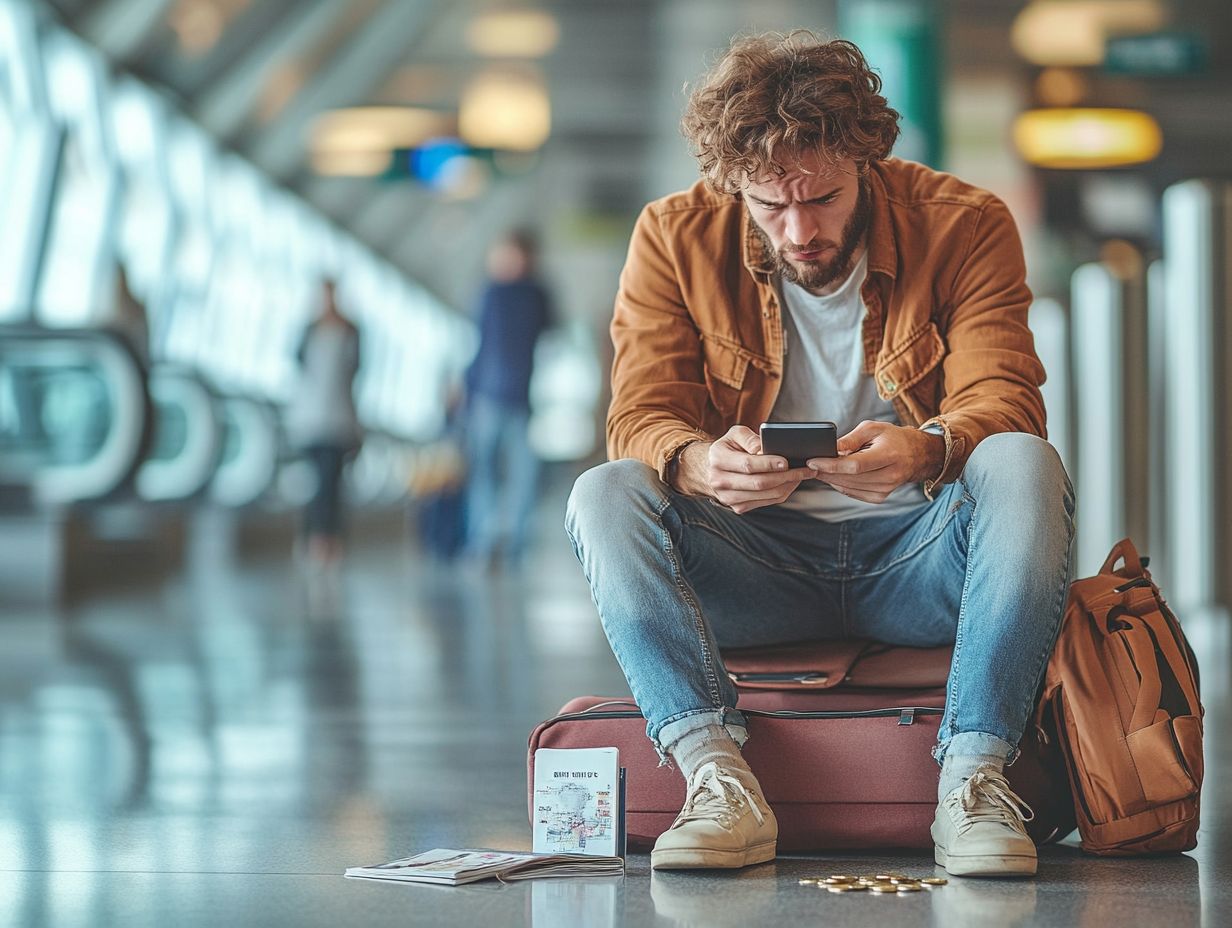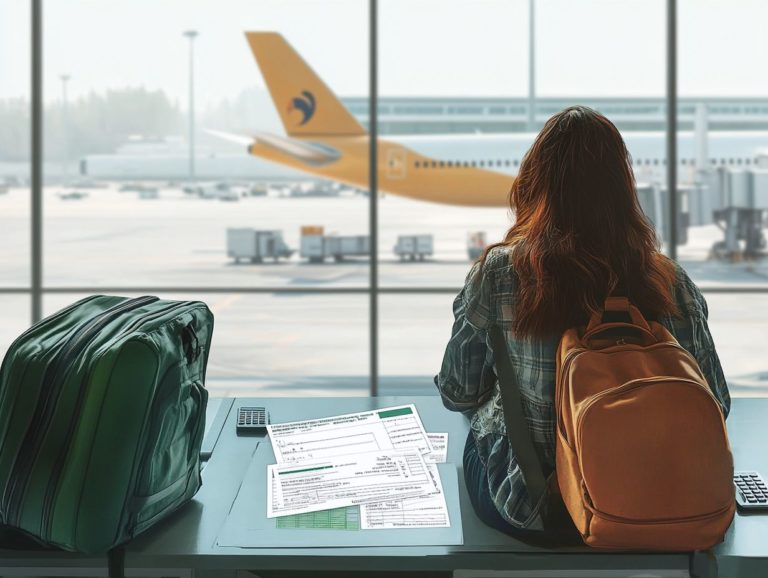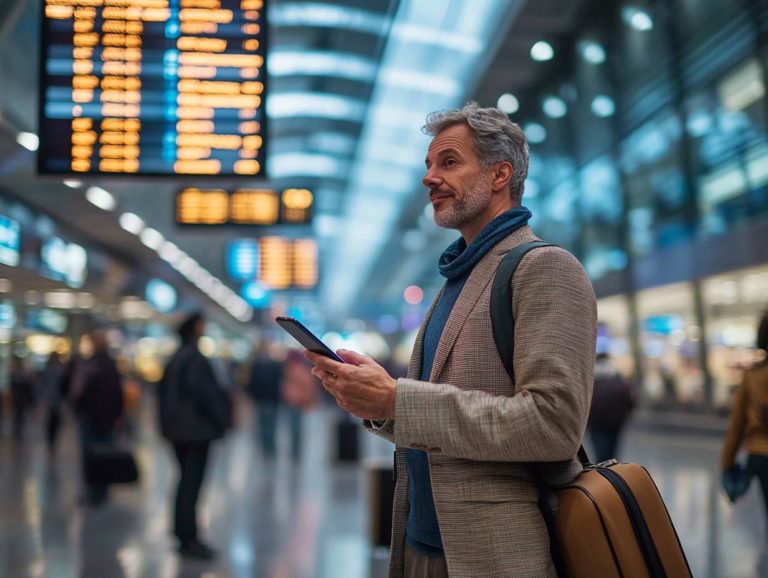What to Do If You Run Out of Money Abroad?
Traveling can be one of life s greatest adventures. Yet, it often comes with unexpected challenges especially in finances.
Finding yourself short on funds abroad can be daunting. But with the right preparation and strategies, you can handle it confidently.
Get ready for an adventure! Here are vital steps to ensure your financial success before you travel, immediate actions if your funds dwindle, options for accessing emergency money, and long-term strategies for maintaining financial stability.
Whether you re a seasoned traveler or about to embark on your very first adventure, this information will help ensure your experiences remain enjoyable and stress-free.
Contents
- Key Takeaways:
- Preparation Before Traveling
- Immediate Steps to Take When Running Out of Money Abroad
- Options for Obtaining Emergency Funds
- Long-Term Solutions for Financial Stability
- Frequently Asked Questions
- What to Do If You Run Out of Money Abroad?
- Can I use my credit card to withdraw cash if I run out of money abroad?
- What if I don’t have a credit card to rely on while traveling abroad?
- Are there other options besides using ATMs if I run out of money abroad?
- What if I am unable to access my bank accounts while abroad?
- How can I avoid running out of money while traveling abroad?
Key Takeaways:

- Plan your budget wisely to enjoy your travels without money worries!
- Assess your situation and prioritize essential expenses if funds run low.
- Contact family or utilize credit cards as emergency options for obtaining funds abroad.
Preparation Before Traveling
Before you travel internationally, prepare carefully. This helps you manage any financial emergencies that may occur.
Thoughtful financial planning and budgeting can significantly reduce stress. Ensure you have access to emergency cash whether through bank transfers, credit cards, or local ATMs.
Familiarize yourself with resources at the U.S. embassy. They can help with lost credit cards, travel scams, or unexpected expenses.
Financial Planning and Budgeting
Effective financial planning and budgeting are crucial. They ensure you have ample funds for your travels, covering necessary expenses while providing a safety net for unforeseen emergencies.
Crafting a detailed budget that outlines potential travel costs can sidestep unexpected financial burdens. Using debit cards, which draw directly from your bank account, and credit cards, which allow borrowing up to a limit, helps manage daily expenses and opens doors to benefits like travel rewards.
Exploring options for financial assistance, such as travel grants or sponsorships, can ease financial pressure. Once overseas, stay aware of your spending habits and review your account balances regularly. This keeps your budgeting on point, allowing you to enjoy your experiences without unnecessary worry.
Immediate Steps to Take When Running Out of Money Abroad
If you find yourself running low on funds while traveling, act quickly to secure emergency cash or financial assistance. You might need to contact a family member for help. You can also use bank transfers or reach out to the nearest U.S. consulate for repatriation loans and other assistance.
Prioritizing your financial stability helps you manage expenses effectively and ensures your safety during your travels.
Assessing the Situation and Prioritizing Expenses

Assessing your financial situation and prioritizing expenses are crucial first steps when funds run low. This allows you to allocate available resources effectively to meet your most urgent needs.
Start by reviewing your current financial status. Check your bank balance, outstanding debts, and any other relevant obligations. Next, categorize your expenses into essential needs, like rent and food, versus non-essential wants, such as dining out or shopping. This evaluation clarifies where you can cut back.
Creating a plan for utilizing emergency cash can truly be a game changer. Reach out to local contacts or expatriate communities for advice or potential financial support. Use social media groups or forums that cater to your location; fellow travelers often share valuable insights and might offer assistance when you’re in a pinch.
Options for Obtaining Emergency Funds
When you encounter financial difficulties while abroad, a range of options opens up for securing emergency funds. From wiring money to getting help from family and friends, each option can provide quick cash when you need it!
By exploring these possibilities, you can gain immediate relief and skillfully navigate your circumstances.
Using Credit Cards or Loans
Using credit cards or loans is a great way to get quick cash while traveling abroad, granting you immediate financial support when you need it most.
Credit cards often come with many useful features like travel rewards, cashback on purchases, and insurance for lost luggage or trip cancellations, making them a smart choice for international travelers like you. With the right card, you can earn points that can be redeemed for flights and hotel stays, enhancing your overall travel experience.
Many credit cards provide a safety net through cash advances, which can be crucial when you need local currency. If you’re considering loans, understanding loans to help pay off debts when you return home is essential; they can be your ally in managing any debts accrued abroad. Keep an eye on repayment schedules by setting reminders or automatic payments to ensure your credit health remains intact when you return home.
Asking for Help from Friends or Family
Reaching out to friends or family for help when you’re low on funds abroad is a smart move, giving you the support needed to manage immediate expenses.
To make this process go smoothly, it s vital to communicate your needs clearly and respectfully.
Start by outlining your situation succinctly, focusing on the specific help you require without unnecessary details.
When transferring money, use trusted apps or banks to ensure trust and security. Always opt for reputable services that offer transaction tracking and encryption to protect your personal information.
Finally, expressing gratitude and being clear about repayment can strengthen your relationships and encourage a more supportive response.
Long-Term Solutions for Financial Stability

To achieve long-term financial stability while enjoying your travels, it’s crucial to develop a thorough plan for managing future travel expenses. Reflecting on past experiences will provide valuable insights, allowing you to refine your budgeting strategies and make informed adjustments as needed.
Creating a Plan for Future Travel Expenses
Creating a detailed plan for your future travel expenses is essential for maintaining financial stability during your journeys abroad. This approach helps you account for all potential costs and emergencies.
To do this effectively, start by categorizing your budget into key areas such as:
- Accommodation
- Food
- Activities
- Emergency funds
By assigning specific amounts to each category, you ll gain clarity on where your money will go. Remember, accommodation costs can vary dramatically based on location and preferences, so it pays to research options ahead of time. Budgeting for meals is also crucial, whether you’re dining out at local gems or cooking for yourself.
It’s wise to set aside funds for activities and experiences that will truly enrich your trip. To keep everything on track, consider using budgeting tools and mobile apps. These can simplify expense tracking and provide real-time insights that help you adjust your spending habits as necessary.
Start planning your finances today to ensure a more enjoyable travel experience!
Learning from the Experience and Making Changes
Learning from your travel experiences and making necessary adjustments to your travel budget can markedly enhance your future adventures. This ensures you’re well-prepared for any challenges that may arise.
Reflecting on past financial hurdles is essential. It helps you pinpoint what went awry and understand how unexpected expenses can disrupt a carefully crafted budget.
By critically assessing your previous spending habits, you can uncover patterns or missteps that contributed to financial strain during your journeys. This newfound awareness will enable you to implement proactive budgeting strategies, such as setting up a savings fund strictly for travel mishaps.
Sharing experiences with fellow travelers brings many benefits. Collective insights often reveal effective solutions and inspire better financial habits.
Encouraging dialogue fosters growth and enhances everyone’s travel budgeting capabilities. This creates a richer travel experience for all involved.
Frequently Asked Questions
What to Do If You Run Out of Money Abroad?

If you find yourself in a situation where you have run out of money while traveling abroad, here are some steps you can take:
Can I use my credit card to withdraw cash if I run out of money abroad?
Yes, you can use your credit card to withdraw cash from an ATM if you run out of money while traveling. Keep in mind that this may come with additional fees and a higher interest rate.
What if I don’t have a credit card to rely on while traveling abroad?
If you do not have a credit card, try to withdraw cash from your debit card at an ATM. Just make sure to notify your bank beforehand and check if they have partnerships with international banks to avoid high fees.
Are there other options besides using ATMs if I run out of money abroad?
Yes, you can also exchange currency at a local bank or money exchange office. Just be aware of the exchange rate and any fees associated with the transaction.
What if I am unable to access my bank accounts while abroad?
If you cannot access your bank accounts while traveling, reach out to a family member or friend who can transfer money to you. You can also contact your bank to explain the situation and see if they can assist you.
How can I avoid running out of money while traveling abroad?
To avoid running out of money while traveling abroad, budgeting is key to enjoying your travels without stress! Plan your expenses ahead of time and research the cost of living in the country you are visiting. Set aside enough funds for your trip and have a backup plan, such as a credit card, just in case of emergencies.






